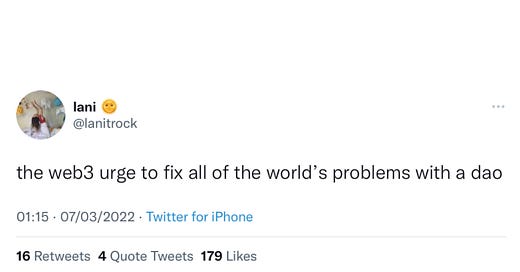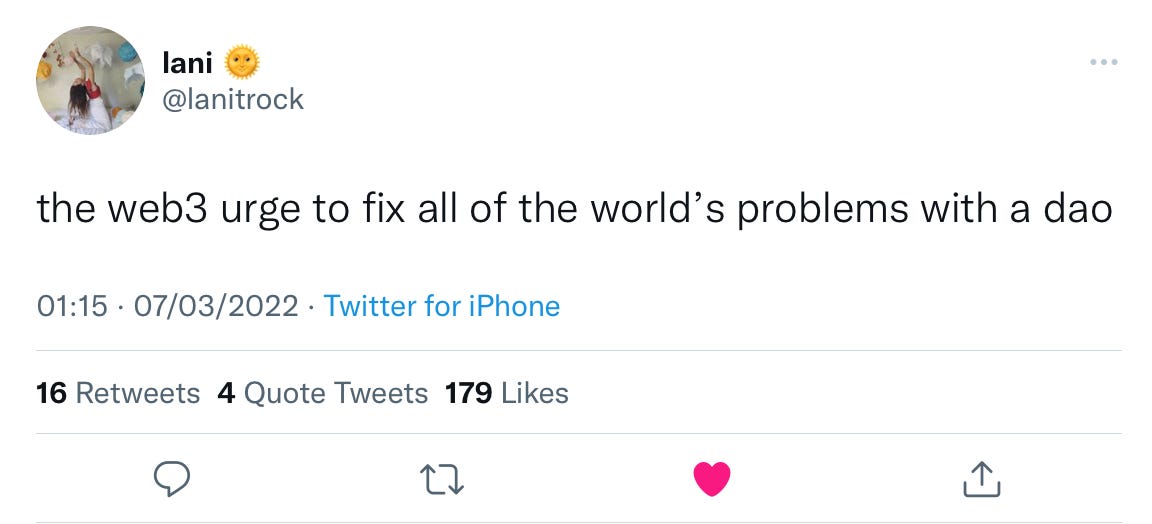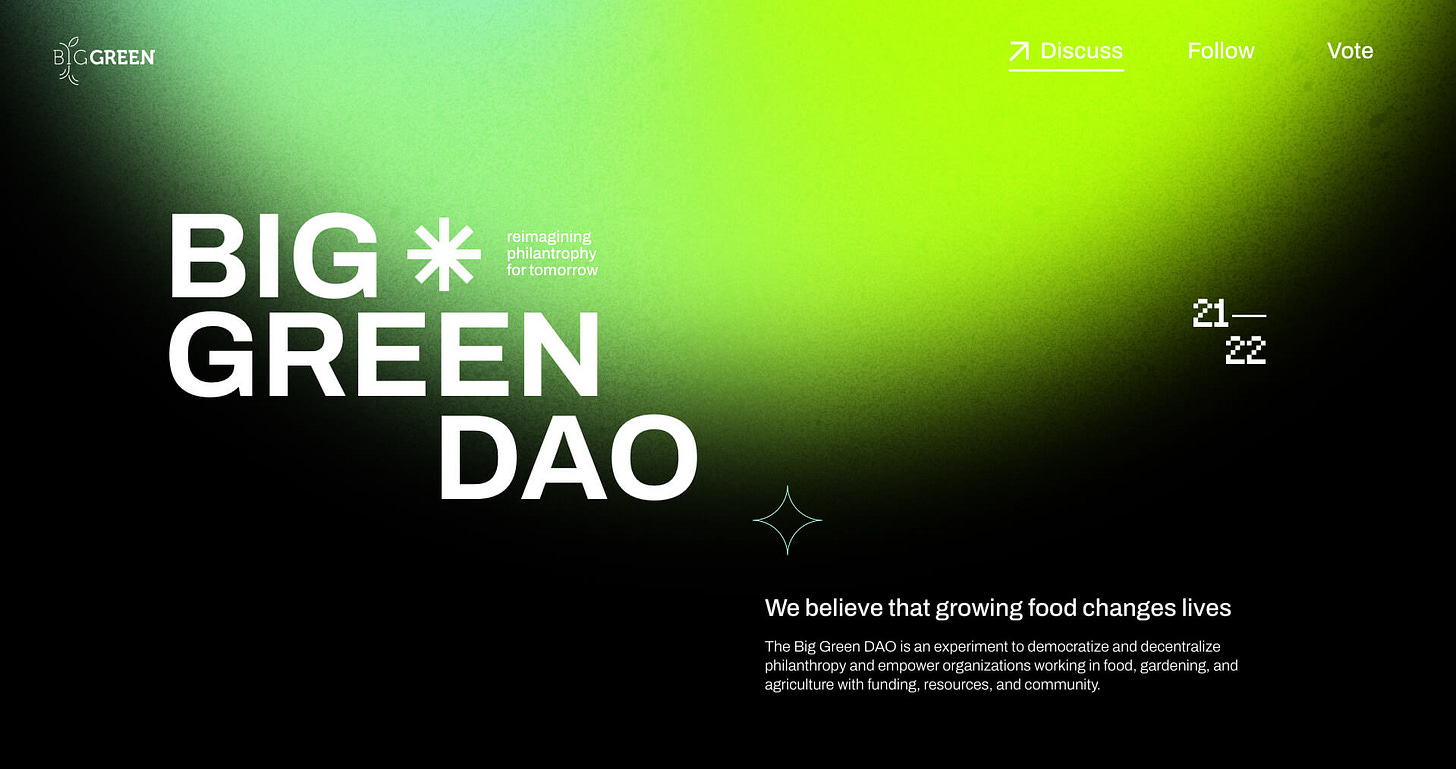The web3 urge to fix all of the world’s problems with a DAO
An optimistic stance on the role DAOs could play in the future of philanthropy, shared values, and generally wanting the world to be better.
I’ve said it before and I’ll say it again: I’m just a web2 girl tryna make it in a web3 world. Regardless, sometimes I’m required to write things about web3, and I welcome these opportunities. Mostly because – despite commanding only a basic understanding of the blockchain, decentralisation and all the other stuff that underpins web3 – like most things, I have a lot of opinions about it.
In seriousness though, I find writing about this space super useful as a means of (1) forcing myself to do some half decent research about the phase of the internet that I will be required to learn about if I want to keep my job long-term and (2) to try to help others who are less engaged with web3 discourse feel a bit less alienated from what tf is going on w the internet.
This essay is one I adapted from a piece I wrote a couple of months ago about DAOs for the Creative Review, which was originally published here. Web3 literacy requirement: 0/10.
Quick links, tweets + wider reading at the bottom 🔖
When people think of web3, many think of NFTs and the metaverse, of obscenely expensive virtual assets and ‘immersive’ entertainment opportunities. But few are looking at the vast opportunity web3 – and its monolithic, if slightly lofty, promise of decentralisation – offers for the future of trust, social change and investing in what you believe in.
What’s a DAO again?
DAOs – pronounced ‘dows’, an acronym for Decentralised Autonomous Organisations – are potentially at the heartland of this promise. These communities have been described as the members’ clubs of web3, but this only further contributes to the unhelpful rhetoric of elitism these groups are already shrouded in.
It might be most accurate to describe a DAO as a group chat with a shared bank account, in which everyone in the group gets a vote on how the cash is spent.
Where does the cash come from?
The cash in this shared account usually comes from one of two places:
Sometimes, when a DAO is founded there’s a seed pot, invested in by VCs or founders. There’s even a DAO called Seed Club, whose pot is used to seed fund other DAOs (v meta).
The pot then grows as people buy the DAO’s ‘tokens’: a cryptocurrency specific to the DAO. Token holders also get voting rights on how cash is used or distributed.
DAOs are often perceived as mysterious and complex, but unlike metaverse experiences or branded NFT auctions, many of these self-governed communities have thus far proven themselves to be quietly useful in achieving social change.
Here are 3 of my favourite examples of DAOs being used to create movement towards a better world:
Ukraine DAO is an anonymous fund for the victims of war
Initiated by UK-based Ukrainian activist Alona Shevchenko, and amplified by Russian activist collective Pussy Riot, Ukraine DAO enabled people from all over the world (including Russia) to anonymously raise $8 million for Ukrainian aid. Anyone who contributed to the pot by buying into the DAO got access to a Discord server, where they could connect with others who care about the same cause, and get updates on how it was being distributed.
Unicorn DAO is a creator fund for queer and female artists
Co-founded by Pussy Riot (yep, again), Grimes, Beeple and a wider network of artists and activists, Unicorn DAO is a creator fund for queer and female artists. Artists in the DAO are given tokens and voting rights, and are able to pitch creative ideas. Anyone who buys a token contributes to the fund available for these artists to use, and can vote on which projects receive funding.
Big Green DAO is a fund promoting food justice and equality
Kimbal Musk, younger brother of Elon, recently launched his own experimental DAO – Big Green DAO – which he offered the seed pot for. He gave the first 6 votes to a committee of philanthropic organisation leaders working in food and tech to disrupt the world of food injustice and inequality. Over the course of the year that it runs, all decisions made about how to use the capital in the fund will be made by the token holders, and they also have the power to invite other organisations into the DAO to share the pot. Musk’s stated aim is to disrupt the philanthropic system by getting money to grassroots groups that might otherwise be overlooked by big philanthropic organisations, all the while ensuring maximum transparency.
What have DAOs got that other philanthropic collectives or institutions don’t?
Well… a fresh shot at trust, for one. With rising concern over governments and big tech platforms controlling people’s online behaviour, DAOs are offering a new way of doing things. They’re bound by rules written into the blockchain, so financial transactions don’t need to be monitored by a government or third party. They offer a transparent and democratic way to fund causes, and provide a space where people can not only participate in and connect with communities, but fuel and fund them too.
DAOs present a trustworthy, transparent way for capital to be shared among any number of activists, organisations or individuals.
For people, this translates as a transparent way to donate to causes, creators or collectives they believe in – whether investing in queer artists or food equality.
For brands, this translates as a trustworthy way to make positive change happen. This is especially important given the creeping rise in scepticism towards cause-related marketing: according to one study from 2021, 71% of people globally don’t believe brands will deliver on their CSR-led promises.
DAOs are the future of this space because they enable people and brands to not only invest in causes, but to do so with utmost transparency. Further, instead of donating to large NGOs or philanthropic organisations, capital can be transferred at scale directly to the people and activists that need them.
So… about the brands. Should they all be starting DAOs, then?
Not necessarily. But brands can harness the power of DAOs as a way to directly fund causes and groups that align with their values, and build active communities around those causes. There are a ton of ways this could manifest, but in my estimation, there are two that stand out, which would be far more useful than investing in random plots of land in Decentraland or buying up Bored Apes:
Brands could provide the seed pot for a DAO
In the future, we could see brands invest in existing DAOs that reflect their values or create seed funds for new DAOs (though in either case, they should forego any voting rights, as Musk did). Imagine Adidas, which has been channeling its marketing dollars into addressing the problem of marine plastic waste, funding the beginnings of a DAO dedicated to tackling plastic pollution.
Brands could donate to existing DAOs’ shared pots
We could even see brands collaborate with DAOs to give them exposure and reach wider audiences – if the DAOs token holders vote for it to happen, of course. What if, instead of buying CryptoPunk NFTs, Visa invested in a DAO focused on redistributing wealth to people in need, or aiding the unbanked?
Since this technology is still emerging and evolving, a lot still stands in the way of the mass uptake of DAOs, and the impact they might have. Some of those barriers include:
Social hierarchies. Creating a democratic collective that enables everyone to vote, but still rewards higher contributions of time, cash or both.
Notification fatigue. I’m sorry but has anyone ever used a Discord server? Or three?? Or ten??? If the world is going to take on yet more social obligations in the digital space, we’re gonna need some next level curation – even if it is to siphon cash and attention into the causes we care about.
Onboarding. If DAOs are all about trust and transparency, people are going to need to grasp the basics of how they work – just enough to feel safe. Figuring out how to educate people on the deep complexities of web3 may not be feasible, though: instead, it may be about creating an interface through which the everyperson can easily engage, without compromising on transparency.
Regardless of the above, I guess what I’m saying is that DAOs – jargon and apparent opacity aside – could genuinely offer people an opportunity to contribute meaningfully to whatever they consider to be a better world.
To my web3 skeptics out there – sure, I’m being optimistic. But maybe that’s what web3 needs. In last week’s newsletter I linked to a global study that shows the more we think Facebook is bad for ourselves and for society, the more likely we are to self-report that we spend too much time on it, and that it’s damaging our well-being.
It’d be cute to transition into web3 on the right foot, before the human nature gets a chance to fuck with it 🥲
Other stuff from around the internet:
‘No worries if not’, Maybe Baby (June 2022)
I’ve spent the last couple of months thinking about this phrase a lot, since it pretty much sums up my historic lack of boundaries – both personally and professionally. This write-up articulates my mixed feelings around this well-trodden part of my vocabulary perfectly. Definitely worth a read if you’re also prone to the odd “no worries if not.”
‘may I humbly submit Alberta hot lesbian oil’, Twitter (June 2022)
I literally have no clue if this is real or not, but it feels like an appropriate way to remind everyone that it’s Pride month so the brands are here and they really want us to know that they’re queer.
‘Everything is terrible, but I’m fine’, The Atlantic (June 2022)
Some fascinating data showing that while the average American is generally pretty happy with their life, their perception is that the well-being and happiness of the nation is in decline. This piece explores some of the drivers and implications of this, including the idea that exposure to so much news via social is making us more pessimistic about the state of the world.
‘The Depp-Heard verdict, pro-ana, tradwives, etc.’, Twitter (June 2022)
Another day, another totally accurate take on the Depp-Heard verdict 💀
‘The DeuxMoi subreddit is rebelling’, Embedded (June 2022)
Fascinating essay exploring the dynamic between r/DeuxMoi and celebrity gossip Instagrammer @DeuxMoi. The former is a reddit community formed to commentate on the latter, but don’t mistake it for a fandom. This article explores the disputes that have led the two communities to deadlocked mutual distaste. For me, this feels like a social manifestation of ‘the medium is the message’: in our atomised social landscape, the platform you’re on will determine the vibe of the community as much as the subject matter itself.
‘NPCs to my early intelligence build’, Instagram (May 2022)
I literally can NOT stop consuming gamer girl content, even if I don’t play Elden Ring. I’ve recently seen a load of gaming creators that are overlaying gaming content with heavy girliness as a pushback against the male gaze that dominates the space, and it’s really bringing out the nostalgic teen in me. My days of playing World of Warcraft and GTA at college would’ve been so much more joyful w this content in my life!!!
‘‘Crypto ruined my life’: the mental health crisis hitting Bitcoin investors’, Vice (February 2022)
This isn’t super new, but is a fascinating deep dive into something I’ve been hearing more about recently: the mental health crisis impacting crypto investors amid the current crash. It includes an interview with a psychotherapist who offers CBT for crypto-related mental health issues, which on the one hand is just totally wild… but also makes complete sense.







